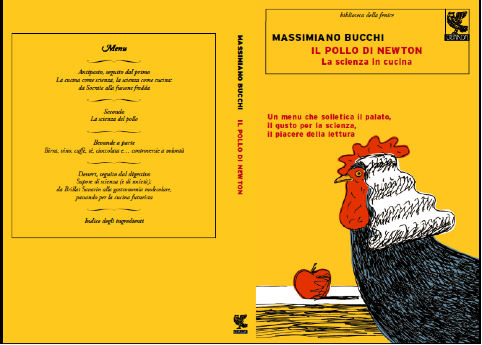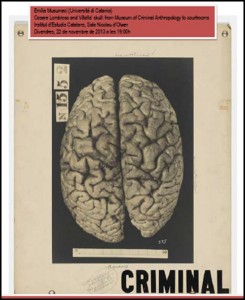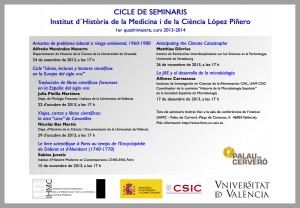Reading group
UAB, Departament de Filosofia
Sala de reunions, B7/113
Organisation: Thomas Sturm
All welcome. The readings can be ordered from Thomas Sturm (Thomas.Sturm AT uab.cat).
Session 1 – Thursday, December 5, 2013, 11:30-1:30: The genetic/naturalistic fallacy
Hanson, N. 1962. The irrelevance of history of science to philosophy of science. Journal of Philosophy, 59, 574-586.
Giere, R. 1973. History and philosophy of science: Intimate relation or marriage of convenience? British Journal for the Philosophy of Science, 24, 282–297.
NOTE: Giere refers to: Stuewer, R. H. (ed.) 1970. Historical and philosophical perspectives of science. New York: Gordon and Breach. – All papers are here: http://www.mcps.umn.edu/philosophy/completeVol5.html
Session 2 – Friday, December 20, 2013, 11:30-1:30 (please bring Christmas cookies): Defending the necessity of the marriage 1
McMullin, E. 1976. History and philosophy of science – a marriage of convenience? In R.S. Cohen et al. (eds.), PSA 1974, Boston Studies in the Philosophy of Science 32 (pp. 585-601). Dordrecht: Reidel.
Kuhn, T. 1977. The relations between the history and the philosophy of science. In T. Kuhn, The essential tension (pp. 3–20). Chicago: Chicago UP.
Session 3 – Friday, January 17, 2014, 11:30-1:30: Defending the necessity of the marriage 2
Burian, R. M. 1977. More than a marriage of convenience: On the inextricability of the history and philosophy of science. Philosophy of Science, 44, 1–42.
Shapere, D. 1977. What can the theory of knowledge learn from the history of knowledge? The Monist, 60, 488-508.
Session 4 – February 28, 2014, 11:30-1:30: A marriage of reason
Krüger, L. 1978. Does a science need knowledge of its history? In: Krüger, L. (2005), Why does history matter to philosophy and the sciences? Ed. by T. Sturm, W. Carl & L. Daston. Berlin: De Gruyter, Ch. V.1.
Krüger, L. 1982. History and philosophy of science – a marriage for the sake of reason. In L. J. Cohen, J. Łoś, H. Pfeiffer & K.-P. Podewski (Eds.), Proceedings of the VI. International Congress for logic, methodology and philosophy of science, Hannover 1979 (pp. 108–112). Amsterdam: North-Holland.
Session 5 – Friday, March 14, 2014, 11:30-1:30: The role of history of philosophy
Krüger, L. 1986: Why do we study the history of philosophy? Krüger, L. (2005), Why does history matter to philosophy and the sciences? Ed. by T. Sturm, W. Carl & L. Daston. Berlin: De Gruyter, Ch. V.2.
Friedman, M. 1993. Remarks on the history of science and the history of philosophy. In P. Horwich (ed.), World changes: Thomas Kuhn and the nature of science (pp. 36-54). Cambridge/MA & London: MIT Press.
Session 6 – Friday, April 11, 2014, 11:30-1:30: The dilemma of case studies
Pitt, J. 2001.The dilemma of case studies: Toward a heraclitian philosophy of science. Perspectives on Science, 9, 333-382.
Burian, R. 2001. The dilemma of case studies resolved: The virtues of using case studies in the history and philosophy of science. Perspectives on Science, 9, 383-404.
Session 7 – Friday, May 9, 2014, 11:30-1:30: New directions
Galison, P. 2008. Ten problems in history and philosophy of science. Isis, 99, 111-124.
Schickore, J. 2011. More thoughts on HPS: Another 20 years later. Perspectives on Science, 19, 453-481.
Arabatzis, T. & J. Schickore, 2012. Introduction: Ways of integrating history and philosophy of science. Perspectives on Science 20:4, 395-408.
Session 8 – Friday, June 6, 2014, 11:30-1:30: New directions
Kitcher, P. 2011. Epistemology without history is blind. Erkenntnis, 75, 505-524.
Giere, R. 2011. History and philosophy of science: Thirty-five years later. In Schmaltz, T. & S. Mauskopf (eds.), Integrating history and philosophy of science: Problems and prospects (pp. 59-66). Dordrecht: Springer.
HPS: A marriage? (Incomplete bibliography)
Achinstein, P. 1974. History and philosophy of science: A reply to Cohen. In Suppe, F. (ed.), The Structure of Scientific Theories (pp. 350-360). Urbana: University of Illinois Press
Arabatzis, T. & V. Kindi. 2008. The problem of conceptual change in the philosophy and history of science. In S. Vosniadou (ed.), International handbook of research on conceptual change (pp. 345-373). London: Routledge.
Arabatzis, T. & J. Schickore, 2012. Introduction: Ways of integrating history and philosophy of science. Perspectives on Science 20:4, 395-408.
Burian, R. M. 1977. More than a marriage of convenience: On the inextricability of the history and philosophy of science. Philosophy of Science, 44, 1–42.
Burian, R. 2001. The dilemma of case studies resolved: The virtues of using case studies in the history and philosophy of science. Perspectives on Science, 9, 383-404.
Burian, R. M. 2002. Comments on the precarious relation between history of science and philosophy of science. Perspectives on Science, 10, 398-407.
Chang, H. 2011. Beyond case-studies: History as philosophy. In: S. Mauskopf and T. Schmaltz (eds.), Integrating History and Philosophy of Science: Problems and Prospects (pp. 109-124). Dordrecht: Springer.
Domsky, M. & Dickson, M. (Eds.) (2010). Discourse on a new method: Reinvigorating the marriage of history and philosophy of science. (La Salle: Open Court)
Feigl, H. 1970. Beyond peaceful coexistence. In R. H. Stuewer (ed.), Historical and Philosophical Perspectives of Science, Minnesota Studies in the Philosophy of Science, Vol. 5 (University of Minnesota Press), pp. 3-11.
Friedman, M. 1993. Remarks on the history of science and the history of philosophy. In P. Horwich (Ed.), World changes: Thomas Kuhn and the nature of science (pp. 36-54). Cambridge/MA & London: MIT Press.
Friedman, M. 2008. HPS in a new key. Isis, 99, 125-134.
Galison, P. 2008. Ten problems in history and philosophy of science. Isis, 99, 111-124.
Giere, R. 1973. History and philosophy of science: Intimate relation or marriage of convenience? British Journal for the Philosophy of Science, 24, 282–297.
Giere, R. 2011. History and philosophy of science: Thirty-five years later. In Schmaltz, T. & S. Mauskopf (eds.), Integrating history and philosophy of science: Problems and prospects. Dordrecht: Springer.
Golinski, J. 2011. Thomas Kuhn and interdisciplinary conversation: Why historians and philosophers of science stopped talking to one another. In S. Mauskopf and T. Schmaltz (eds.), Integrating History and Philosophy of Science: Problems and Prospects (Springer), pp. 13-28.
Hanson, N. R. 1962. The irrelevance of history of science to philosophy of science. The Journal of Philosophy 59:21, 574-586.
Hatfield, G. (1996). The importance of the history of science for philosophy in general. Synthese, 106, 113-138.
Hoyningen-Huene, P. (1993). Reconstructing scientific revolutions: Thomas S. Kuhn’s philosophy of science. Chicago: University of Chicago Press.
Kitcher, P. 2011. Epistemology without history is blind. Erkenntnis, 75, 505-524.
Kuhn, T.S. (1962/2nd, rev. ed. 1970). The structure of scientific revolutions. Chicago: University of Chicago Press.
Kuhn, T. S. 1977. The relations between the history and the philosophy of science. In Kuhn, The Essential Tension (University of Chicago Press), pp. 3-20.
Kuhn, T. S. 1980. The halt and the blind: Philosophy and history of science. The British Journal for the Philosophy of Science, 31:2, 181-192.
Krüger, L. 1982. History and philosophy of science – a marriage for the sake of reason. In L. J. Cohen, J. Łoś, H. Pfeiffer & K.-P. Podewski (Eds.), Proceedings of the VI. International Congress for logic, methodology and philosophy of science, Hannover 1979 (pp. 108–112). Amsterdam: North-Holland.
Krüger, L. 2005. Why does history matter to philosophy and the sciences? Ed. by T. Sturm, W. Carl & L. Daston. Berlin: De Gruyter.
Lakatos, I. & Musgrave, A. (eds.) 1970. Criticism and the growth of knowledge. London: Cambridge University Press.
Lakatos, I. 1974. History of science and its rational reconstructions. In Elkana, Y. (ed.), The interaction between science and philosophy (pp. 195-241). Atlantic Highlands, NY: Humanities Press.
Laudan, L. 1989. Thoughts on HPS: 20 years later. Studies in History and Philosophy of Science, 20, 9-13.
Laudan, L., A. Donovan, et al. 1986. Scientific change: Philosophical models and historical research. Synthese, 69, 141-223.
McMullin, E. 1970. The history and philosophy of science: A taxonomy. In R. H. Stuewer (ed.), Historical and Philosophical Perspectives of Science, Minnesota Studies in the Philosophy of Science, Vol. 5 (University of Minnesota Press), pp. 12-67.
McMullin, E. 1976. History and philosophy of science – a marriage of convenience? In R.S. Cohen et al. (Eds.), PSA 1974, Boston Studies in the Philosophy of Science 32 (pp. 585-601). Dordrecht: Reidel.
Pitt, J. 2001.The dilemma of case studies: Toward a heraclitian philosophy of science. Perspectives on Science, 9, 333-382.
Ruse, M. 1993. Do the history of science and the philosophy of science have anything to say to each other? PSA: Proceedings of the Biennial Meeting of the Philosophy of Science Association 1992, 467.
Schickore, J. 2011. More thoughts on HPS: Another 20 years later. Perspectives on Science, 19:4, 453-481.
Schindler, S. 2013. The Kuhnian mode of HPS. Synthese.
Shapere, D. 1977. What can the theory of knowledge learn from the history of knowledge? The Monist, 60, 488-508.
Steinle, F. & R. Burian 2002. Special issue: History of science and philosophy of science. Perspectives on Science 10.
Steinle, F. & R. Burian. 2002. Introduction: History of science and philosophy of science. Perspectives on Science 10:4, 391-397.
Stuewer, R. H. (ed.) 1970. Historical and philosophical perspectives of science. New York: Gordon and Breach.
Wartofsky, M. 1979. The relation between philosophy of science and history of science (written 1977). In M. Wartofsky, Models: Representation and the scientific understanding (pp. 119-139). Dordrecht: D. Reidel.


